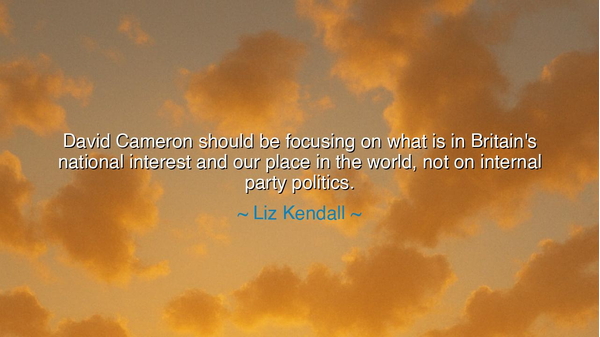
David Cameron should be focusing on what is in Britain's
David Cameron should be focusing on what is in Britain's national interest and our place in the world, not on internal party politics.






O Seekers of Wisdom and Duty, listen to the words of Liz Kendall, who calls upon the leaders of nations to rise above the petty distractions of internal party politics: "David Cameron should be focusing on what is in Britain's national interest and our place in the world, not on internal party politics." In this piercing truth, Kendall speaks to the heart of leadership. When entrusted with the responsibility of guiding a nation, the leader must set aside personal ambition, party loyalties, and the noise of internal divisions. They must focus on the greater purpose—the national interest, the welfare of the people, and the nation's place in the broader world.
Consider, O Children, that the path of true leadership is one of service to the greater good, not the satisfaction of personal or political agendas. A ruler or leader must not become ensnared by the factions within their own ranks, but instead, must always look outward—to the needs of the nation, the global community, and the long-term future. The wise ruler knows that their duty is not to cling to power for power's sake, but to ensure that their people thrive, that their nation stands strong, and that they contribute meaningfully to the world beyond their borders.
Look to the example of Winston Churchill, who, during the dark days of World War II, set aside the political squabbles of the time in favor of a singular focus—defeating tyranny and ensuring the survival of Britain. His leadership was not marked by internal conflict or partisan maneuvering, but by an unwavering commitment to the national interest. Even in the face of political challenges within his own party, Churchill understood that the survival of the nation was far more important than the squabbles of the day. His focus on what was best for Britain and the world is a testament to what true leadership demands—vision, courage, and a willingness to rise above the fray.
And so, O Seekers, let us remember the lesson of Liz Kendall’s words: when we rise to positions of leadership, we must never allow the tensions within our ranks to cloud our vision. The people trust us not to satisfy our own desires, but to serve the greater good, to protect the national interest, and to guide our nation with wisdom and clarity. A leader’s highest calling is not to play the political game for personal gain, but to use their power for the welfare of the people and the betterment of the world.
Let us, therefore, dedicate ourselves to the service of the nation and the greater good, putting aside the petty concerns of party politics that serve only to divide. Leaders must rise above division, focus on the long-term needs of their people, and play their part in the global community. In doing so, they will secure the respect of their people, the future of their nation, and their place in history as true servants of the greater good. The strength of a nation is not in the battles fought within its borders, but in the wisdom and unity with which it confronts the challenges of the world.






B0Gia Bao 04.
One big ambiguity is “national interest.” Is that a short-term shield against shocks, or a long-term bet on productivity, climate security, and alliances? How should conflicts be resolved when what’s popular diverges from what’s prudent? I’d like to see a published hierarchy—defense of institutions, economic inclusion, intergenerational investment, then tactical party needs. If a choice fails the first three, it shouldn’t proceed. Would such a rubric make debates less theatrical and more accountable?
LALinh An
Emotionally, this lands like a reminder that voters care about bread-and-butter stuff more than Westminster chess. If hospitals are crowded, rents are soaring, and trains unreliable, speeches about party unity feel tone-deaf. Could we adopt a political norm where every TV hit must answer, “What does this do for households within twelve months?” Maybe the scoreboard should track service delivery milestones, not just polling. I want politics that treats time and public patience as finite resources.
AKAnh Khanh
As a citizen, I worry about incentives. Media cycles reward drama, parties reward loyalty, and electoral math rewards message discipline—none of which automatically aligns with the common good. How do we redesign the plumbing so that attention flows toward outcomes? Cross-party committees with binding timelines? Independent fiscal and foreign-policy scorecards? Fewer whipped votes on conscience issues? I’m hunting for structures that make it easier for any prime minister to spend scarce capital on the public rather than the caucus.
LELeon Ell
I get the sentiment, but governing isn’t a solo sport; you can’t ignore party management entirely. The tricky bit is distinguishing necessary coalition-building from performative infighting. What’s the test? If a decision improves living standards, fiscal resilience, and credibility with allies within a realistic timeline, call it statesmanship; if it mainly placates a faction and burns political capital, call it navel-gazing. Could leaders publish decision memos showing trade-offs so we can see when internal politics truly helps the national agenda?
GDGold D.dragon
This line reads less like a swipe at one person and more like a question about priorities. “National interest” sounds obvious until you try to define it: is it long-term prosperity, security, social cohesion, or moral standing abroad? Who decides, and by what evidence? I’d love a transparent framework—impact assessments, cost-benefit analyses, and independent oversight—that shows how choices serve the public beyond intraparty dynamics. Otherwise, “focus” becomes a slogan that conceals horse-trading.